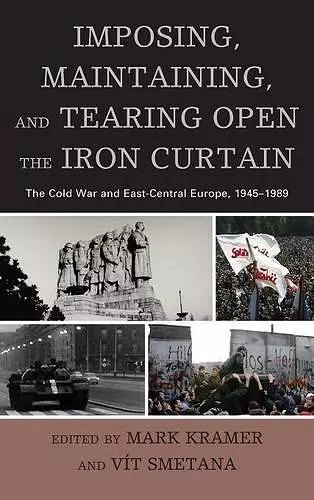Imposing, Maintaining, and Tearing Open the Iron Curtain
The Cold War and East-Central Europe, 1945–1989
Mark Kramer editor Vit Smetana editor
Format:Hardback
Publisher:Lexington Books
Published:22nd Nov '13
Currently unavailable, and unfortunately no date known when it will be back

The Cold War began in Europe in the mid-1940s and ended there in 1989. Notions of a “global Cold War” are useful in describing the wide impact and scope of the East-West divide after World War II, but first and foremost the Cold War was about the standoff in Europe. The Soviet Union established a sphere of influence in Eastern Europe in the mid-1940s that later became institutionalized in the Warsaw Pact, an organization that was offset by the North Atlantic Treaty Organization (NATO) led by the United States. The fundamental division of Europe persisted for forty years, coming to an end only when Soviet hegemony in Eastern Europe dissolved. Imposing, Maintaining, and Tearing Open the Iron Curtain: The Cold War and East-Central Europe, 1945–1989, edited by Mark Kramer and Vít Smetana, consists of cutting-edge essays by distinguished experts who discuss the Cold War in Europe from beginning to end, with a particular focus on the countries that were behind the iron curtain. The contributors take account of structural conditions that helped generate the Cold War schism in Europe, but they also ascribe agency to local actors as well as to the superpowers. The chapters dealing with the end of the Cold War in Europe explain not only why it ended but also why the events leading to that outcome occurred almost entirely peacefully.
The twenty-four articles here . . . do provide impressive coverage of a wide variety of topics. The reader will find studies of great-power relations, accounts of machinations within the Soviet Bloc, old-fashioned foreign policy reviews, and big-picture essays, from many of the leading scholars in the field. . . .The idea underpinning the book is a good one, and the volume will certainly have value as a reference on the Soviet Bloc and its disintegration. * The Russian Review *
Central Europe and the Onset of the Iron Curtain, contains excellent contributions by Laszlo Borhi on Hungary and Smetana on Czechoslovakia, both of which show that Sovietization was a top-down process, undertaken locally but with the pace and timing determined by Moscow’s wider strategic interests. . . .a reexamination of a global conflict in a specific, nonglobal setting, the collection succeeds admirably. * Slavic Review *
The international group of authors has enriched the secondary literature on the history of the Cold War with an impressive collection of essays that bears testimony to thorough research and impressive knowledge. * Hungarian Historical Review *
In this collection of essays, some of the world's most distinguished scholars reflect on the most recently opened archival documents and provide penetrating assessments of the Cold War in Europe—from start to finish. -- Melvyn P. Leffler, University of Virginia
This impressive volume of essays explores the rise and fall of the Soviet bloc in light of the newest archival evidence from around the world. Expertly edited by Mark Kramer and Vit Smetana, the book should be read by anyone interested in the history of the East-West confrontation and its dynamic relationship to the emergence of communism in East Central Europe and its precipitous collapse in 1989. -- Norman Naimark, Stanford University
ISBN: 9780739181850
Dimensions: 235mm x 158mm x 39mm
Weight: 1039g
582 pages